英语grammar1
九年级英语 Unit5 Grammar1课件 牛津版
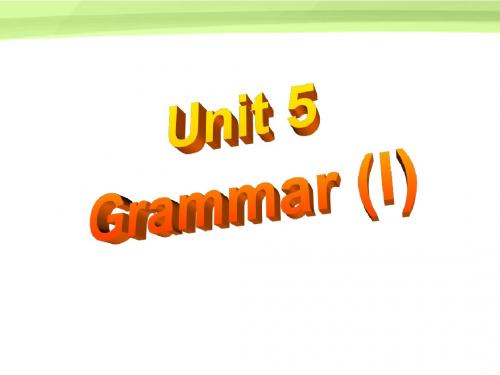
We use the past perfect tense to talk about an action that happened before another action in the past. The earlier action is expressed in the past perfect tense and the later action is expressed in the simple past tense.
1.过去完成时常与 before 等词构成的短语连用。如: 过去完成时常与by, 等词构成的短语连用。 过去完成时常与 1) 到上学期末为止我们已学了三千多个英语单词了。 到上学期末为止我们已学了三千多个英语单词了。
We had learned over 3,000 English words by the end of last term.
4.过去完成时可用在宾语从句中或通过上下文表示。如: 4.过去完成时可用在宾语从句中或通过上下文表示。 过去完成时可用在宾语从句中或通过上下文表示
1)他说他已买了一辆新自行车。 1)他说他已买了一辆新自行车。 他说他已买了一辆新自行车 He said he had bought a new bike. 2) 我同桌告诉我她去过北京两次了。 我同桌告诉我她去过北京两次了。 My partener told me she had been to Beijing trwice.
1)做完作业后,他上床睡觉了。 做完作业后,他上床睡觉了。 做完作业后 After he had finished his homework, he went to bed. 2)当他关了灯后 就锁上门回家了。 当他关了灯后, 当他关了灯后 就锁上门回家了。 When he had turned off the light, he locked the door and went home.
英语七年级上册 Unit 1 Grammar 1【牛津版】【精品课件】1
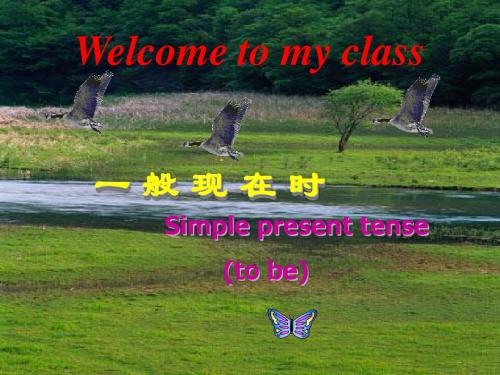
一般现在时
Simple present tense (to be)
Read the new words loudly!
eat maths walking lunchtime day always usually sometimes
-
fish walk fly every drawing weekend run often
总结:Simple present
tense of the verb ”to be”
I am a teacher.
am is are
肯定句 I am… He/she/it is… We/you/they are…
Sandy’s hair is long and black.
否定句 I am not… He/she it isn’t… We are in the classroom. We/you/they aren’t… 疑问句 Are you/we/they……? 表示目前的状态或客观事实 Is he/she/it……?
be 后+形容词
• Sandy is from China. be 后+介词短语 • We are in Class One, Grade Seven. • The girls are behind the trees.
• some exercises .
补充习题 Page5 A1
把下列句子改为否定句:
I _____ he _____ we _____ Amy_____ you _____ she _____ it _____ you _____ they _____ my parents_____
人教版高中英语必修一unit1grammar
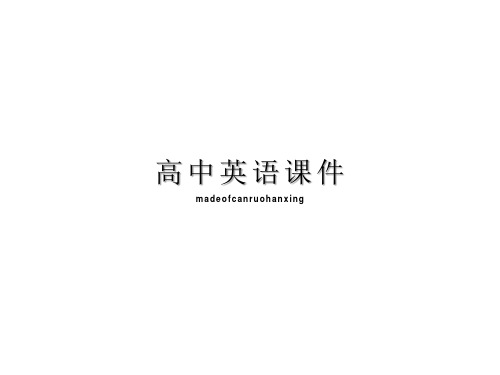
Whenyouchangeasentencefromdirects peechtoindirectspeech,yousometimes needtochangetheverbtense.Youmayal soneedtochangepronouns,timeinorder
tokeepthesamemeaning.
“Idon’tlikecomputers,”Sarahsaidtoherfriends.
Sarahsaidtoherfriends that Idon’tlike
computers. Sarah said
she
didn’t
Sarahsaidtoherfriendsthatshedidn’tlikecomput ers.
he
harvested Theyaskedhimwhenheharvestedthewheat.
选择疑问句
•用whether…or…表达,而不用if…or…,也 不用either…or… • Heasked,“DoyouspeakEnglishorFrench?”
• HeaskedmewhetherIspokeEnglishorFrenc h.
3.Tomsaid“Iwillseeyounextweek.” Tomsaidthathewouldseemethenextweek.
4.“Whywereyoulateagain?”Theteachersaidtome. TheteacheraskedmewhyIwaslateagain.
5.“Idon’tlikeswimming,”saidSarah. Sarahsaidshedidn’tlikeswimming.
一般疑问句
•间接引语用连词whether或if引导,原主句中 谓语动词said要改为asked(me/him/us等), 语序是陈述句的语序
高一英语必修一Unit1Grammar语法直接引语间接引语
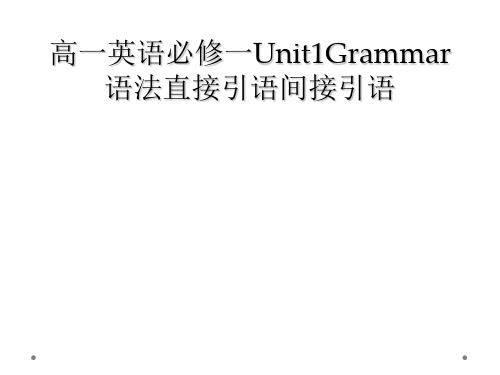
仍用一般现在时。例如: Teacher said to us:" The moon moves round
the earth." Teacher told us the moon moves round the earth. The teacher said to us : “Light travels faster
宾语从句
判断以下哪些句子属于间接引语
She said that she didn’t want to be a teacher. 间接 She said, “I don’t want to be a teacher〞.直接 He said, “ I like playing football〞. 直接 He said that he liked playing football. 间接
3. Mr Black said, “I have walked a long way this week.〞 Mr Black said that __ a long way __. A. I had walked…last week B. he had walked…that week C. I walked…last week D. he has walked…this week
〞 • 间接引语 Mum told me that I could clean my bedroom the next day . • Mr. Smith said,“He is a good worker. ’’ • Mr. Smith said that he was a good worker.
3.人称的变化
• 直接引语里的第一人称和第二人称,变间接引语时,人称要做相 应调整。例如:
九年级英语全册《Unit3 grammar1》课件 人教新目标版
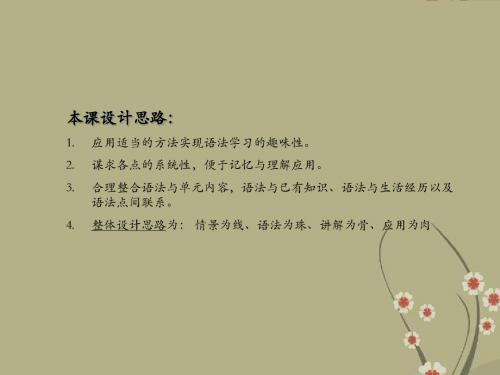
宾语
OC. My parents do not allow me to go out after 6p.m.
宾宾语补足语
More practice
1. The boy promises not to be O for school again. late
宾语
OC. 2. Mr Wu tells the students not to shout in class.
Let’s read the advice and identify the sentence elements.
Chatting time.
It’s time for you to talk with your partner. One of you can just read the problems in A1and the other give the advice in A2. Or you can chat about your own problems. But remember to use “to—infinitives”.
Home work
1. Read the sentences in Part A. 2. Go over the usage of “to—infinitives.
To hand in S homework on time is good.
主语
It is good to hand in homework on time.
I hope to hear from you soon. O
Pred. My dream is to be a great football player.
Why?
You have to.
Unit 1语法Grammar some和any及复合不定代词讲义 牛津深圳版英语八年级上册
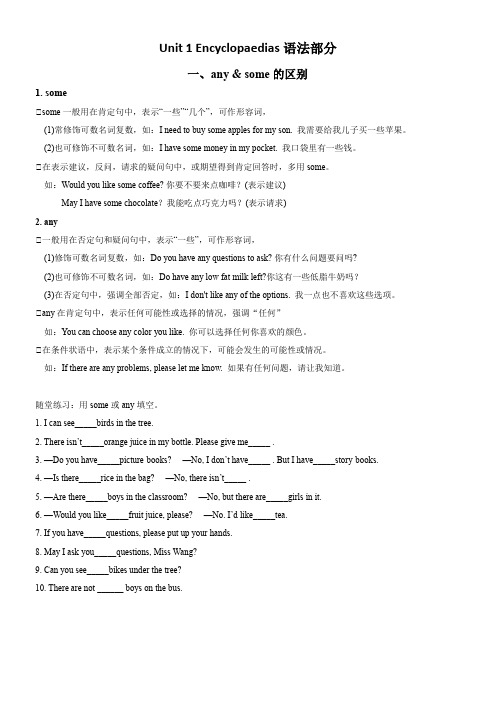
Unit 1 Encyclopaedias语法部分一、any & some的区别1. some①some一般用在肯定句中,表示“一些”“几个”,可作形容词,(1)常修饰可数名词复数,如:I need to buy some apples for my son. 我需要给我儿子买一些苹果。
(2)也可修饰不可数名词,如:I have some money in my pocket. 我口袋里有一些钱。
①在表示建议,反问,请求的疑问句中,或期望得到肯定回答时,多用some。
如:Would you like some coffee?你要不要来点咖啡?(表示建议)May I have some chocolate?我能吃点巧克力吗?(表示请求)2. any①一般用在否定句和疑问句中,表示“一些”,可作形容词,(1)修饰可数名词复数,如:Do you have any questions to ask?你有什么问题要问吗?(2)也可修饰不可数名词,如:Do have any low fat milk left?你这有一些低脂牛奶吗?(3)在否定句中,强调全部否定,如:I don't like any of the options. 我一点也不喜欢这些选项。
①any在肯定句中,表示任何可能性或选择的情况,强调“任何”如:You can choose any color you like. 你可以选择任何你喜欢的颜色。
①在条件状语中,表示某个条件成立的情况下,可能会发生的可能性或情况。
如:If there are any problems, please let me know. 如果有任何问题,请让我知道。
随堂练习:用some或any填空。
1. I can see_____birds in the tree.2. There isn’t_____orange juice in my bottle. Please give me_____ .3. —Do you have_____picture-books?—No, I don’t have_____ . But I have_____story-books.4. —Is there_____rice in the bag?—No, there isn’t_____ .5. —Are there_____boys in the classroom?—No, but there are_____girls in it.6. —Would you like_____fruit juice, please?—No. I’d like_____tea.7. If you have_____questions, please put up your hands.8. May I ask you_____questions, Miss Wang?9. Can you see_____bikes under the tree?10. There are not ______ boys on the bus.二、复合不定代词1.构成2.区别(1)something,somebody,someone通常用于肯定句;anything,anyone,anybody通常用于否定句、一般疑问句或条件状语从句中。
Unit1Grammar课件牛津译林版英语九年级上册
get any milk.
*16. Excuse me, _b_u_t__ could you show me
how to use the machine?
both either neither none all any的用法
I am active and energetic, and I love working with people.
Let’s join the two sentences together.
1. He doesn’t like to talk much. 2. His work shouts!
(but) join two different ideas
◆ We use ‘so’ to express the result of something. Attention: If the two subjects and verbs are the same, we do not need to repeat the first ones when we join ideas together with and, but and or .
两者
三者或三者以上
任何一个
either
any
都
both
all
任何一个都不
neither
none
作不定代词 either/both/neither/any/ all/ of sth. (sb.) 名词复数
both of us neither of the twins either of the two answers
8. — Have you seen Tom and Mary? —No, I haven seen _n_e_it_h_e_r__ of them.
牛津译林版英语九上grammar1
If-clause (simplepresenttense)
Ifyouareafootballfan,
Ifyouareananimallover,
If-clause (simplepresenttense)
Mainclause (will/may/might/…+in finitive)
Ifyouenjoysolvingmyst youmightlikethisfilm. eries,
attackcatchhuntliveprotectwalk
Dad:Whatwilltigersdoiftheyhavebabies? Millie:Tigers(9)___________asafamilyif willlive they(10)____________. havebabies Dad:Whatwillmalewolvesdoifthere’s danger? adj.雄性的 Millie:Malewolves(11)____________their willprotect familiesifthere(12)___________. isdanger
单项选择。 1.If there ________ no buying and selling of animals, there _______ no killing in nature. A. A is; will be B. will be; will be C. is; is D. will be; is
1 Unlesstheweatherreportsaysitis
goingtorain,______c 2Wewillarriveatthestudioaround9:30a. m.,_______ d
牛津译林版八年级英语上Unit1 Grammar1课件
不规则变法
little far old
Complete the table .
adjective funny
good happy
comparative
funnier
superlative
funniest best happiest
better
happier
interesting
large
more interesting most interesting larger smarter redder largest smartest reddest
worst worse bad 最差的 更差的 Which flower is ______, worse this one or that one ? That flower is ________ the ,更糟的 worse adj. 最差的,最糟的 worst n. 高,高度 height /ai/ n. 重量 weight /ei/ n. 秒(=second) Sec. competition n. 竞赛,比赛,竞争 v./n. 测试,考查 test n. 游泳者 swimmer
1. We use comparatives + than to compare two people or things. e.g. Tom is cleverer than Daniel. This film is more interesting than that one.
We add -er / -est after short adjectives. We use more/ most before long adjectives.
zxxk
How tall the woman is!
牛津译林版英语七上U2Grammar(1)
我们用一般现在时谈论事实和状态
•
Weusesimplepresenttense whenwetalkabout:
thingsthat weoftendo
thingsthat arealways true
Milliegetsupat6:30e Catseatfish. verymorning.
be i
2以sh,ch,ss,x和o结尾的动词加es
miss misses finish finishes go goes watch watches fix teach
•
fixes teaches
3.以辅音字母加y结尾的,把y改成ies
fly
flies
study studies
4.以元音字母加y结尾的动词,直接加s say says play plays
•
3.______Amyenjoyreading? Does _____________. Yes,shedoes
4._______Simonlikewalking? Does _____________. No,hedoesn’t
5.______SimonandDaniellovedrawing? Do _____________. No,theydon’t
•
WelcometoSportsClub
TaskOne
TaskTwo TaskThree
TaskFour
•
Negativesetences(否定句)
I/You/ We/They
donot/do n’t
watchballgames.
He/She/It
doesnot/do esn’t
•
Interviewyourpartners
- 1、下载文档前请自行甄别文档内容的完整性,平台不提供额外的编辑、内容补充、找答案等附加服务。
- 2、"仅部分预览"的文档,不可在线预览部分如存在完整性等问题,可反馈申请退款(可完整预览的文档不适用该条件!)。
- 3、如文档侵犯您的权益,请联系客服反馈,我们会尽快为您处理(人工客服工作时间:9:00-18:30)。
• 2)I don’t believe she’s a singer, __________?
• 2.there be 句型 • 3. everything, something, everybody,
Had+ 过去分词
Should/would/could/ might+ have+过去分词
动 词 过 去 式 , Should/would/could/ (should+) 动 词 原 形 , might+动词原形 were to + 动词原形
• 2. 省略if 的虚拟条件句 如果从句中含有were, had 或should词时,可将if省
• 3. none, some, any, more, all, most 等做主语时,动词的单 复数由其指代的词的单复数决定。
• 4. every, each, either, neither, one, another, little , a little, much做主语或修饰主语时,谓语动词通常用单数。
• 3. Postdeterminer 基数词;序数词;next, last ,other another, many, a few, little, more, most; several, plenty, a lot, a great deal of, a small amount of; such …
Tag Question +Subjunctive Mood +
Modal Auxiliary
Tag Question
• 1. 陈述部分是主从复合句,附加疑问部分应 与主句的主语和谓语动词一致;当陈述部分是 第一人称主语+think, believe, expect, suspect等结构式,附加疑问句往往与并与从 句的主语和谓语保持一致,但注意否定转移。
• 1. Predeterminer all, half, both;倍数;分数;what an, such an…
• 2. Central Determiner 冠词;指示代词;人称代词;名词属格;不定代 词(some, any, no, each, every, either…);what, whose, which…
nobody…
• 4. 祈使句(imperative sentence),will you, won’t you, shall we?
• 5. 句子含有have相关词汇,表示有,可用have,也 可用does…;不表示“有”,用其他。
• 6.情态动词 must have,肯定,一定,根据上下文推测具体情况。
Sentence eplement (subject complement, object complement)
• subject • object • predicative • attribute • adverbial • appositive
Determiner (18)
“前位+中位+后位” ,后位可叠加
• e.g. Which of the following is INCORRECT? • A. All his lectures were boring. • B. Half his money was gone. • C. Her few friends are all fond of singing. • D. He invited many his friends to the party.
Subject-verb agreement (12)
• 1. 主语加with, together with, including, as well as, except, more than, along with,…等,谓语和前面主语一致。
• 2. 当or, either…or, neither…nor, not only… but also连接两 个以上主语时,谓语采用就近原则。
• 5.would rather, would sooner, might as well, would prefer 之后用虚拟语气表示愿望。
• 现在或将来:过去式 • 过去:过去完成时
Modal Auxiliary
• Need, dare • 1. 情态动词 • 1)Need we go to class on this weekend? • Yes, we must./No, we needn’t. • 2) I dare not walk beside him. • 2.实义动词 • 1) You need a computer, don’t you? • 2) He doesn’t dare to hold her hand.
去,把were, had 或should等提到主语之前, 引 起倒装。
3.错综时间虚拟条件句 有时候,条件从句表示的动作和主句表示的动作发生
在不同的时间,比如一个是过去,一个是现在。则 主句和从句根据各自的不同时间选择适当的虚拟语 气。 If I had listened to you, I would not feel so sad now.
You must have missed the bus, didn’t you?
Subjunctive Mood
• 1. if 非真实条件句的基本用
假设法类型
条件从句谓语动词形式 主句动词谓语形式
与现在事实相反 与过去事实相反 与将来事实相反
动词过去式(be用were) Should/would/could/ might+动词原形
• 4. it is + 形容词/名词/过去分词+that 引导的 主语从句,主语谓语用should+动词原形
• important, necessary. urgent, vital… • a pity, a shame, no wonder that • desired, suggested, demanded…
